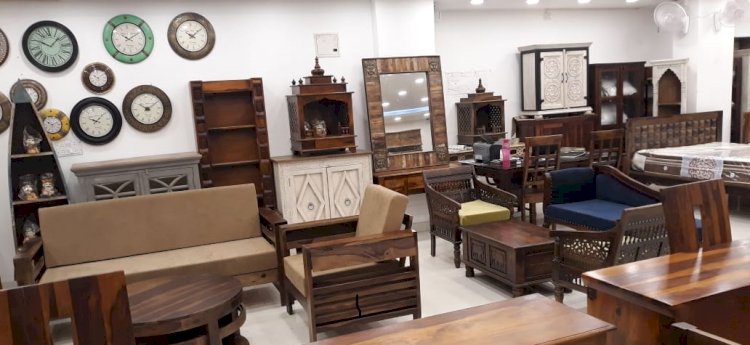Turkey Furniture Market to Grow at a CAGR of 18.5% during Forecast Period
A recent study by the strategic consulting and market research firm, BlueWeave Consulting, revealed that the Turkey furniture market was worth USD 1.31 billion in 2021. The market is projected to grow at a CAGR of 18.5%, earning around USD 4.27 billion in revenues by the end of 2028.

A recent study by the strategic consulting and market research firm, BlueWeave Consulting, revealed that the Turkey furniture market was worth USD 1.31 billion in 2021. The market is projected to grow at a CAGR of 18.5%, earning around USD 4.27 billion in revenues by the end of 2028. Turkey Furniture market is booming due to factors like an increase in disposable income and changing lifestyle. The key drivers influencing the growth and development of the furniture market are raising demands from the real estate sector and an increase in the urban population in numerous emerging economies throughout the world.
Rising Demand For Branded Home Furniture Couple With Building of New Constructions To Drive the Market
The growing desire for branded home furnishings and consumer purchasing power on home decor items drive the furniture market. The population is expanding, which makes it necessary to create new hotels, offices, hospitals, schools, colleges, education centers, and other public facilities, increasing the number of new infrastructure and development projects. To support the expanding population, the current infrastructure is also being upgraded. As more money has been invested in building new infrastructure and renovating old infrastructure, it is projected that the demand for furniture will continue to rise throughout the course of the forecast period.
There is a growing interest in furniture made with sustainable materials, which is a major trend propelling the market. Due to formaldehyde-based products, consumers today mostly experience skin irritation and breathing difficulties. In order to prevent these circumstances, consumers are switching to formaldehyde-free sofa sets and chairs made of eco-friendly materials like rattan, bamboo, recycled textiles, and others.
Moreover, the demand for the more modern styles of office furnishings in such settings is projected to decrease due to the growing acceptance of interior designs such as cubicles, anchoring points, and others in corporate infrastructure settings. Growing consumer interest in outdoor recreation activities like gardening and planting will open up new markets for patio tables and garden chairs.
Request for Sample Report @ https://www.blueweaveconsulting.com/report/turkey-furniture-market/report-sample
Wood Segment Accounted For The Largest Market Share By Material
In 2021, the wood segment held the most market share; throughout the forecast period, the CAGR for this segment is expected to be the highest. Turkey has one of the most diverse floral kingdoms in the world. This expansion is expected to accelerate because wood is a naturally available raw material that can be utilized to create practically all types of furniture products. Turkey's sizable milling and wood manufacturing sectors are well-positioned to export wood products to regional Middle Eastern markets, particularly those countries lacking their own wood manufacturing businesses. Turkey is also well-positioned to compete in the European Union's market for semi-processed wood products and furniture because of its relatively lower labor costs. The panel and furniture industries, two sectors in Turkey that are dependent on forest products, have strengthened their capacity over the past 10 years, allowing them to benefit from these regional opportunities.
Impact of COVID-19 on Turkey Furniture Market
The COVID-19 pandemic that occurred in the early days of 2020 significantly altered the furniture industry. The countries that rely heavily on imports for their furniture needs have been severely impacted by the disruption of the supply chain and the temporary suspension of global trade. The COVID-19 pandemic has also made it clear how crucial it is for this sector to stop depending on imports and to advance digitalization and automation. The COVID-19 lockdown requirements led upholstery shops to close across the nation. The restriction forced upholstery shops to experience a fall in sales. The sale of furniture from these shops was also restricted due to the risk of coronavirus infection.
Moreover, the pandemic increased maritime trade volume, which led to a significant increase in freight forwarding costs and a significant increase in the demand for containers. All nations were impacted, but China was perhaps most severely, as a significant portion of its exports are dependent on the marine channels. This implied a switch to more affordable alternatives. Due to the fact that most of Turkey's trade with Europe takes place via highways, furniture importers from Turkey had an advantage over their rival competitors countries in freight forwarding. Additionally, the shift in corporate worker's preferences toward remote working during the pandemic phase is primarily responsible for houses growing need for work desks and chairs and is constantly propelling the market growth nationwide.
Competitive Landscape
The key players operating in the Turkey furniture market are Istikbal Mobilya, Dogtas Mobilya, Idas, ENZA Home, Tepe Home Mobilya, Alfemo, Bellona, Mudo Concept, and other prominent players.
Situations can alter from side to side in the fiercely competitive global market with its infinitely variable measures, and what might be the standard today might not be tomorrow. Post-COVID, the market's conditions have undoubtedly changed; those who do so quickly will succeed, while those who resist change will fall behind. Turkish furniture is expanding, changing, and advancing the sector quickly. The producers provide high-end, fashionable furniture that is dependable and of the highest quality. In the upcoming ten years, Turkish furniture is prepared to take on a far more significant role on a global scale.
Contact Us:
BlueWeave Research Blog
Phone No: +1 866 658 6826
Email: info@blueweaveconsulting.com





























